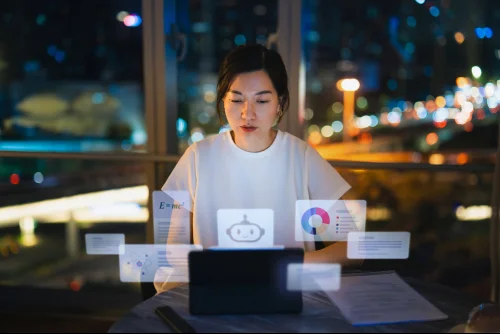Can AI Combat Loneliness, or Will It Drive Us Further Apart?
As published in


As AI continues to shape our world, its impact on mental health and workplace dynamics is a hot topic. For businesses and individuals alike, loneliness is a growing concern—especially during the holidays, when isolation peaks. Research highlights a staggering 36% of Americans feel “serious loneliness”, including 61% of young adults and 51% of mothers with young children. In the workplace, the numbers are equally alarming, with 40% of employees reporting loneliness on the job.
AI is emerging as a promising tool in this space, with applications ranging from mental health chatbots to workplace solutions that aim to reduce isolation. But as an AI keynote speaker, I pose this question to organizations worldwide: Are these innovations truly addressing loneliness—or are they inadvertently deepening it?
The Role of AI in Mental Health and Loneliness
AI’s potential to alleviate loneliness is undeniable. Chatbots like Woebot provide emotional support on demand, while AI companions like Replika offer a semblance of human connection. In the workplace, AI tools are helping managers identify isolated employees and create tailored interventions. For businesses looking to implement AI strategy, these solutions can be transformative, boosting both morale and productivity.
However, the question remains: Are we using AI to complement human connection—or to replace it?
The Challenges of AI and Loneliness
While AI offers short-term solutions, its long-term impact on mental health and workplace culture is less clear. As we increasingly turn to technology for connection, there’s a risk of redefining relationships in ways that could exacerbate loneliness:
- Emotional Detachment: Interacting with AI may dull our ability to navigate real human emotions, leading to a lack of authentic connections.
- Workplace Isolation: Remote work, facilitated by AI-powered platforms, often lacks the spontaneous, organic interactions that build camaraderie.
- Dependency on AI: Overreliance on AI companions could blur the lines between genuine support and artificial empathy.
Big Questions for Leaders and Innovators
- How can AI strategies in mental health and the workplace prioritize human-centric solutions?
- What ethical safeguards are needed to ensure AI enhances—rather than replaces—human relationships?
- Can AI help businesses foster collaboration and connection without unintentionally deepening feelings of isolation?
Building an AI Strategy That Tackles Loneliness
For organizations developing AI strategies, the key is balance. AI should act as a tool to enhance connection, not a replacement for human interaction. For example:
- In Mental Health: Use AI chatbots as first-line support while encouraging access to real human counselors.
- In the Workplace: Leverage AI insights to identify lonely employees but pair this with programs that promote in-person collaboration and team-building.
- In Leadership: Position AI as an enabler of emotional intelligence, not a substitute.
The Future of AI and Loneliness
The AI impact on mental health is a critical topic for organizations striving to innovate responsibly. As an AI keynote speaker, I challenge leaders to think beyond immediate outcomes. The ultimate goal should be to use AI to strengthen human relationships, ensuring technology works with—not against—our innate need for connection.

What Alex Can Do For You
Developed and led AI and Innovation strategy for multiple Fortune 100 companies, driving double-digit revenue growth.
Over 20 years of hands-on experience driving transformative business and technology solutions for global brands like Dell, Amgen, IBM, Pfizer, and Cisco.
Recognized by Forbes as “One of the World’s Top Experts on Innovation” and named a “Top AI Keynote Speaker to Watch.”
Frequent contributor to Forbes, Entrepreneur, and Fast Company, sharing actionable insights on AI strategy, the future of work, and innovation.
What sets Alex apart from other top AI speakers and innovation experts?
With AI and innovation elevated to buzzwords, there are plenty of speakers in this space. While many offer insightful keynotes, few can bring the depth of understanding, hands-on experience, and diverse viewpoints that Alex can. Alex doesn’t just talk about AI and innovation. He’s led it at Dell, Pfizer, and Cisco. He’s sat across from C-Suite execs to build global innovation plans. And he’s resonated with audiences at Google, AWS, Disney, Coca Cola, and dozens of other companies with keynotes tailored to their unique AI opportunities. A frequent contributor to Forbes, Inc., Entrepreneur, and Fast Company, Alex has been identified as a Top AI Voice on LinkedIn. He is also the author of a Wall Street Journal Bestseller, Fearless Innovation. Alex’s style is personable, approachable, and human. It’s never caught up in techspeak, or jargon so he resonates with any audience. Learn more about what sets Alex apart. Get in touch.
How does Alex customize keynotes and workshops?
No two organizations’ AI or innovation opportunities, or challenges, are the same. So canned keynotes or one-size-fits-all workshops just won’t do. Instead, Alex uses AI and data to tailor his engagements with available pre-event surveys. Analyzing responses, Alex customizes his content to address key needs and pain points, ensuring his message is meaningful. Speaking with leadership and other event stakeholders, Alex further customizes the content to ensure resonance and relevance, engaging audiences. Add it all up and you have keynotes and workshops that feel like they’ve been created for you—because they were. Learn more about Alex’s methodology. Get in touch.
What events and audiences are right for Alex?
With so much experience leading large-scale innovation initiatives, Alex is able to reach and resonate with any audience, no matter their knowledge level, industry, culture, or department. Captivating audiences from a live stage, or a virtual event, Alex is a fixture at C-Suite summits, innovation conferences, policy talks, offsites, and employee all hands meetings, plus governmental and academia events. An audience looking for fresh perspectives, real solutions, and custom content will find Alex’s keynotes engaging and actionable with ideas they can start applying right away. Curious about Alex’s recommendations for your event? Get in touch.
What companies and organizations have worked with Alex?
Alex’s roster of past clients, keynote engagements, and employers reads like a Wikipedia entry of the world’s most innovative, respected organizations. Disney, Coca Cola, ISO, AWS, Google, LEGO, CAT, IBM, Cisco, Dell, and dozens of other organizations have benefited from Alex’s keynotes, workshops, and strategic advisory services. As the former Managing Director of Innovation Strategy at Cisco, leader of global Innovation Centers and Smart City programs in 7 countries, and creator of innovation tracks for 3 Olympics, Alex’s real-world experience magnifies his impact upon any organization he partners with. Additionally, Alex has worked hands-on with governments, industry groups,startups and scaleups, plus large academic institutions, like the University of Delaware and The University of California, impacting 300,000+ students and thousands of faculty.
What topics does Alex Goryachev cover in keynotes and workshops?
While every keynote or workshop is customized to an event or audience, Alex is often requested by clients to bring a fresh perspective and real-world expertise on topics, including: AI’s impact on work and education Innovation in the age of AI Building buy-in and reducing hesitancy towards AI Policy and ethics related to AI C-Suite and leadership insights on AI Employee engagement in innovation The impact of AI on society Use cases, solutions, and strategies for AI and innovation Innovation culture and proven frameworks Reskilling and workforce preparedness Education and academia policy Government AI policy and legislation For additional topic ideas and recommendations for your event, get in touch.
Turn your next event into AI and innovation action.
These aren’t just better ways to use ChatGPT, or create short-term buzz. This is what the most influential organizations on earth use to shape the future.






